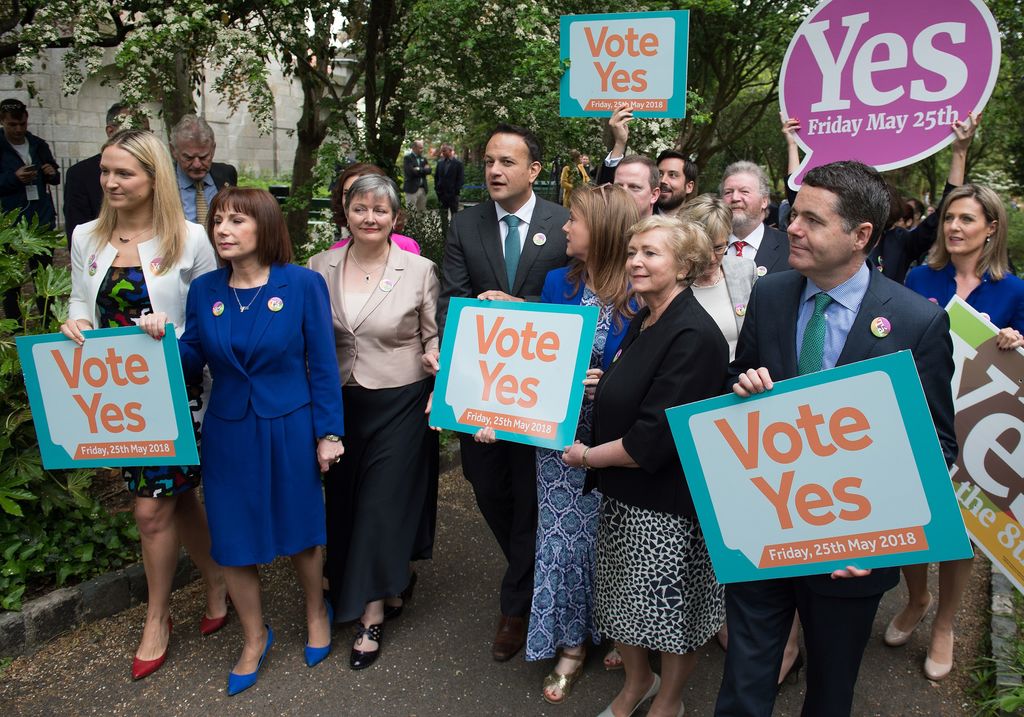It will, as one pro-life campaigner told me, take an act of God to swing the Irish referendum for the No side tomorrow. I’m all for referendums but this one has been so wildly unbalanced as to make the Brexit campaign look almost effete in its regard for impartiality and fair play. The polls suggest a win for the Yes side, on repealing the eighth amendment to the Irish constitution which protects the right to life of the unborn – something around the 44-32 per cent margin according to the last Irish Times poll. It’s a big deal, abortion. But there is not one political party that represents the No side other than a tiny outfit called Renua which doesn’t have a single MP. There is no newspaper that represents this quite hefty minority.
If you want to see an political establishment assembled on one side, you should have been in the Dail yesterday when Leo Varadkar, the Taoiseach, congratulated all the parties for coming together on this issue. He declined to take the sole credit for the outcome. As Miriam Lord, the Irish Times sketchwriter observed in a piece which was really rather revelatory about the sentiment of that paper, “the party leaders…speak with one voice, and that voice says an emphatic Yes. The atmosphere in the chamber is close to one of relief. There is a definite feeling across all the parties now that the Yeses have it.”
Indeed, the consensus was such that Leo called on supporters not to go in for celebrations in the wake of victory. Abortion, you see, isn’t quite the celebratory, feelgood issue that gay marriage is; the foetus is a not very impressive opponent. But it would be strange if they didn’t celebrate, plus the state broadcaster, RTE, plus, obviously the Irish Times et al. Barring a miracle – and I am all for those – they swung it in a consensus that would be embarrassing anywhere else.
But let’s think about the substance of the thing. This issue isn’t about Ireland “catching up with the 21st century” as one young woman put it on the Today programme today. Rather, it’s about something rather remarkable: a constitution that acknowledges pre-natal human rights, though it was always tricky to respect the equal right to life of the mother, which was the other bit of the amendment.
That wasn’t a retrograde development in itself. Quite the contrary, though pro-choicers have made much of saying – usually spitting out the words – that their human rights have been put on a par with that of a foetus. Rather, the foetus’s human rights were put on a par with theirs. The amendment actually recognises what every 12 week scan makes clear, that there’s a human being involved here. Ireland was one of the few jurisdictions to be ahead of the game in acknowledging that palpable humanity. If, when, the amendment is done away with, we shall instead see the entirely irrational situation that a foetus will only be a baby if its mother says so. That’s not a victory for science or reason but for utilitarianism and, in a weird way, sentimentality and obscurantism.
In reality, this principle wasn’t absolute: the foetus could be aborted if the mother’s life was in danger, and this was restated in recent legislation, but it was plain, as Eamon McGuinness, a former chair of the Institute for Obstetricians and Gynaecologists, said, that “if a doctor feels that a pregnancy poses a real threat to a woman’s life, even if that threat is not immediate”, they could abort. But at least the principle was there that the foetus is not merely the equivalent of its mother’s appendix.
I have with me a leaflet from the Yes side which is all about the trauma that some Irish women had to undergo because they had to go to England (take a bow) to have pregnancies terminated in which the baby would probably not have survived birth; that included a statement from the present head of the Institute for Obstetricians and Gynaecologists, John Boylan. These tragic and fortunately rare cases have, extraordinarily, dominated the entire debate, along with the even more tragic and vanishingly rare cases of underage rape victims. But if these were the problem, then it would, as the constitutional expert and pro-lifer, William Binchy (brother of Maeve) made clear, have been quite possible to amend the constitution to allow for abortion in cases where the child would not be born alive. Or, I suppose, for cases involving minors.
Right now an unknown number of Irish women with unwanted pregnancies take abortefacients procured online; the Health Minister, Simon Harris, estimates three a day. But so far none of the online drug takers have been prosecuted; there is no appetite to prosecute them. There is no suggestion that doctors who deal with the effects of taking the drugs will be prosecuted. Yet they are the other grounds for removing constitutional protection from the unborn.
But a known number of Irish women come to England for abortions; nine or 10 a day. They are overwhelmingly not hard cases; they just don’t want a baby. If the vote is carried, they’ll be able to do it in Ireland, up to 12 weeks without a reason; up to six months on the same basis as Britain. That is, a serious risk to the mental or physical risk to the mother. And we know how that works out, do we not? Do you actually know anyone who’s been denied an abortion on that basis?
This is not Ireland advancing into the 21st century, if by that stupid phrase you mean a progressive step. It’s exactly the contrary – a backward step for human rights.


















